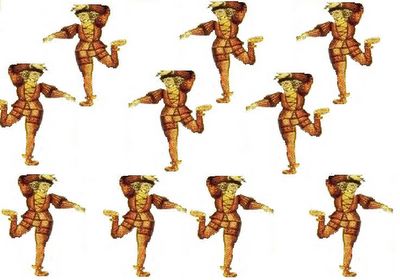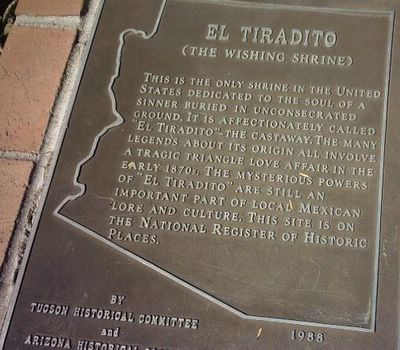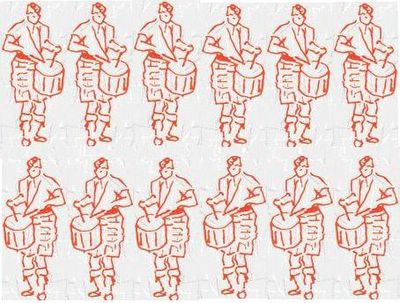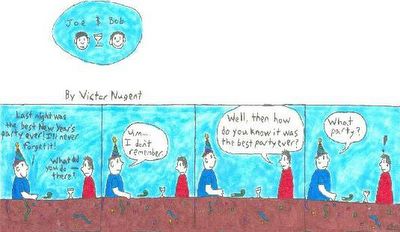Christmas E-Cards
On the tenth day of Christmas,
my true love sent to me
Ten lords a-leaping,
Nine ladies dancing,
Eight maids a-milking,
Seven swans a-swimming,
Six geese a-laying,
Five golden rings,
Four calling birds,
Three French hens,
Two turtle doves,
And a partridge in a pear tree.

The
ten lords a-leaping most likely refers to leaping dancers (called
morris dancers) who performed leaping dances between courses at feasts. This type of wild and strenuous dancing probably evolved from more ancient war and fertility dances and would have been a popular form of entertainment for this type of function. Unlike the
nine ladies dancing in the previous stanza where the dancers appear to have been guests dancing for enjoyment, these were professional dancers brought in to entertain the guests while they dined.
In yesterday's entry I made reference to an article by Fr. Hal Stockert, a Roman Catholic priest and author, in which he claimed that evidence he found indicated that
The Twelve Days of Christmas had been created by Catholics in England as a code to secretly educate their children in the Roman Catholic faith during a period when the practice of the Catholic religion was illegal in Britain. While I am still trying to find Fr. Stockert's original article as well as determine whether it was originally published in print, on the Internet or both, basic facts of Fr. Stockert's thesis are outlined below.
While doing research in the British Isles in late 1970s or early 1980s on a topic totally unrelated to
The Twelve Days of Christmas, Fr. Stockert came across references in old letters and reports to parent's using the
The Twelve Days of Christmas as a code to teach their children the basic tenants of the Catholic faith. In
Origin of the Twelve Days of Christmas http://www.catholicculture.org/lit/activities/view.cfm?id=540 Fr. Stockert states that these references to the carol were made in passing in the letters and articles and were not the main topic of the letters or reports. He also states that the references he found were in letters and reports by Irish Jesuit priests to their superiors in France. Fr. Stockert admits that he did not follow up and research the topic but, finding the information interesting, he made notes of these entries. After he completed and published his original research, he wrote and published a short article about
The Twelve Days of Christmas being a code used by persecuted Catholics in England and included historical background about the laws and official persecutions (including executions) of Catholics in England during this period. By his own admission, the article was based on bits of information that was not thoroughly researched and was presented solely as an item of interest or suggestion for future research by someone else.
Fans and critics alike have jumped on this and thousands of web pages have been devoted to discussing, praising and criticizing the idea of religious symbolism in
The Twelve Days of Christmas. Fr. Stockert has been harshly criticized for sloppy research and not having the facts to back up his claims. This charge of poor research is reinforced by the fact that Fr. Stockert's written notes on this subject were, according to Fr. Stockert, destroyed when a water pipe in the ceiling above the room containing the notes broke and the room flooded. Further, information he originally published on the Internet was posted on a message board of some sort in a format that is no longer readable. Fate has thus made it appear that his article was pure fiction.
While I reject Fr. Stockert's thesis for reasons explained below, I believe that he is a very good scholar and that his intentions were to provide a thought provoking piece for someone else to research more fully and prove or disprove. As to his notes, I believe that they existed and were destroyed as he described – throughout history tons of documents have been lost due to fire, flood, crumbled with age, etc. As to the notes or information published on-line by Fr. Stockert in 1982 these probably are unreadable. The Internet itself did not become available to the public (it was originally a military project) until the first Bush Administration, following the end of the Cold War, made it available to the general public. The World Wide Web, which most of think of when we hear the term
Internet was not created until 1994. Prior to the Internet there existed bulletin boards and various other message type boards on line which information could be exchanged and posted. While the boards still exist the computer code used to generate them is often unreadable as are many things created with older DOS based word processors. The rapid development of computer technology has left behind a large amount of material that currently is not readable using present day computers and software.
From its earliest years to the present the Church has often been forced to operate underground in order to survive. Pope John Paul II ran such a church in Poland prior to his ascent to the Papacy. Other religions have had to operate underground as well. In the Southwestern U.S. there is the four hundred year old story of the
Crypto-Jews http://parentseyes.arizona.edu/bloom/sjhart.htm (also known as
Marranos, Conversos and
hidden Jews) who had been forcefully converted to Catholicism in Spain during the Inquisition but had secretly kept their Jewish faith alive from generation to generation in the Spanish colonies where they had sought refuge from persecution.
In England from 1558 to 1829 it was illegal to be a Catholic or practice the Catholic faith. Priests especially, but members of the Catholic Church in general as well, were arrested and executed, often in a very barbaric manner, for practicing their faith. In Ireland the persecution was conducted with even more zeal. These are documented historical facts and do not need Fr. Stockert's research to support them.
However, the laws and persecutions were limited to a few periods between the years 1558 and 1829. The laws remained on the books but were usually not enforced which enabled Catholics to practice their faith openly. The periods when the Church was forced to operate underground coincided with the era of Queen Elizabeth I and her Stewart successors in which rival claimants to the throne of England, aided by unfriendly foreign governments, sought to forcibly remove the reigning British monarch. Religion was a factor in these disputes but politics and power were the driving force. The references that Fr. Stockert gives http://www.catholicculture.org/lit/activities/view.cfm?id=540 refer to correspondence between Jesuit priests in Ireland with their superiors in France. The Jesuits were a powerful order and often involved in politics. Their vast world-wide network of highly educated and motivated priests was a good source of intelligence which leaders of the order exchanged for increased wealth and power for the order. I am not arguing here whether this was good or bad – it is a fact and for this reason the Jesuits were both used and feared by secular rulers. It is therefore understandable that the British monarchs saw the Jesuits as a serious threat. At various times the Catholic monarchs of France and Spain also went after the Jesuit order despite their common Catholic faith (the old Spanish mission church, San Xavier del Bac http://www.sanxaviermission.org/ in Tucson was founded by the Jesuits but later transferred to the Franciscans when the King of Spain issued an order expelling the Jesuits from Spain and all of its dominions). One need look no farther than the founding of the state of Maryland to see evidence of the lack of enforcement of the anti-Catholic laws. George Calvert, the first Lord Baltimore, was Secretary of State to King James I (successor to Queen Elizabeth I). In 1625 he left public life and practiced his Catholic faith openly. Not only was he not arrested but, in return for his previous service, King James awarded him with a large grant of land in Newfoundland where Calvert attempted to establish a colony. Finding the climate and conditions in Newfoundland too harsh for their plans, Calvert and his son, Cecil Calvert (1606 – 1675), the second Lord Baltimore, petitioned James' son, King Charles I for a second land grant further south and were given the land that is now the State of Maryland. In establishing his colony in Maryland, Cecil Calvert decreed that there would be a separation of church and state and Christians (his freedom of religion did not extend to Jews and other non-Christians) of any denomination were free to worship as they pleased. http://www.baltimoremd.com/monuments/lordbalt.html Here we have two English kings who not only tolerated the open practice of the Catholic faith by a lord of the realm but rewarded him with land grants and stood by as he used the land received to establish a haven for Catholic and other non-Anglican Christians (Puritans and other non-conformist creeds were outlawed along with Catholics during this period.) The fact that the active persecution of Catholics was limited in terms of time is one reason for believing that Catholics would not go to the trouble of investing a secular song with a coded religious message.
A second and, more compelling reason is the fact that, with the possible exception of the seven sacraments, none of the coded teachings in the song were illegal. Both the Roman Catholic and the Anglican (Church of England) shared these beliefs. Teaching a child about the Old and New Testament, the Four Gospels, the Apostle's Creed, etc. was not a way to identify a person as Roman Catholic since Anglican parents taught their children the same articles of faith. I am a practicing Roman Catholic. My father's side of the family were Irish Catholics and I was raised in that religion. However, my Mother's side of the family were Irish Protestants (Presbyterian) from Ulster (Northern Ireland) and my Mother has been an active member of the Episcopal (the American branch of the Anglican Church) since her youth. I have thus, grown up with both churches and have attended mass in both churches. When I attend church with my Mother I have no problem following the mass and responding from memory with the rest of the congregation as the ritual of the mass is essentially the same as that of the Catholic Church. Other than the fact that the current pastor of the church my Mother attends is a woman, there is very little difference between the mass at her church and my own Roman Catholic parish church. My father used to tell a story about a Catholic priest whose big desire in life was to celebrate mass in St. Patrick's Cathedral in New York City. Given the opportunity to visit New York City, the priest went straight to St. Patrick's Cathedral http://www.fordham.edu/halsall/medny/stpat1.html on Fifth Avenue. Arriving just before the morning mass, the priest introduced himself to the priest who was about to celebrate mass and, after telling him of his desire to celebrate mass in this church, asked if he could celebrate the mass with him. Seeing the man's great desire the pastor stepped aside and let the out-of-town priest celebrate the mass. Everything went fine and the priest left the church filled with happiness. On the street outside he bumped into an acquaintance and, pointing to the church he had just exited, excitedly described the joy of having celebrated mass in St. Patrick's. When he finished, his friend had a puzzled look on his face and said,
St. Patrick's is across the street. This is St. Thomas Church. http://www.saintthomaschurch.org/ You just celebrated mass in a Protestant Church!Is the carol
The Twelve Days of Christmas really a code used by persecuted Roman Catholics in the British Isles to teach their children the faith? I think not. Did some Catholics use this carol to secretly teach the faith to their children? Given the large number of Catholics, their differing circumstances, and the varying degrees of enthusiasm of the local officials charged with enforcing the anti-Catholic laws it is possible that some did use the carol for this purpose. If someone were to make a serious attempt to uncover the letters and reports that Fr. Stockert found and then dig further they might discover isolated instances where the carol was used for this purpose. Until then, we have to accept the fact that a theory has been put forward and no one has as yet come forward with hard evidence to prove or disprove it.
Copyright © 2005-2006 by Charles J. Nugent Jr. and Victor L. Nugent.





















